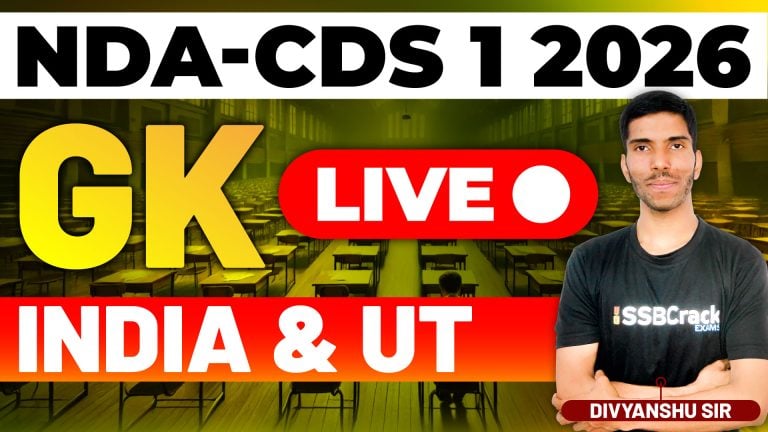Electricity, a vital topic in Physics, is a staple in competitive exams like the National Defence Academy and Naval Academy (NDA-NA) and Combined Defence Services (CDS). Understanding electricity not only boosts problem-solving skills but also strengthens concepts essential for tackling the Physics section of these exams.
A recent class was conducted to refine students’ grasp on the topic of electricity. The session was structured to focus on solving multiple-choice questions (MCQs)—both from previous years and probable questions on subtopics discussed in earlier classes. Here’s a detailed overview of the session and preparation strategies.
Highlights of the Class
The class was practice-oriented, emphasizing MCQs that required conceptual clarity and quick problem-solving. It acted as a bridge between theoretical knowledge and practical application, ensuring students were well-prepared to handle exam-specific questions. Here’s what made the class valuable:
1. Review of Key Concepts
The session began with a quick recap of the foundational concepts of electricity covered in earlier classes:
- Charge and Static Electricity: Understanding the behavior of charges and their interactions.
- Coulomb’s Law: Grasping the nature of electric force between charges.
- Electric Field and Potential: Developing an understanding of electric fields, potential, and potential difference.
- Capacitance: A brief discussion on capacitors and their role in storing charge.
2. Practicing MCQs
The majority of the session focused on solving MCQs. Questions were chosen strategically to cover all critical subtopics:
- Direct Conceptual Questions: Testing understanding of definitions and laws.
- Application-Based Problems: Requiring students to apply concepts like Coulomb’s law and electric fields to solve real-world problems.
- Scenario-Based MCQs: Questions presenting hypothetical scenarios to test analytical thinking.
3. Insights from Previous Years’ Papers
The instructor analyzed questions from previous NDA-NA and CDS exams:
- Patterns in question framing.
- Frequently tested topics like electric fields, potential difference, and capacitance.
- Tricks to eliminate incorrect options in multiple-choice questions.
4. Expected Questions
The session included a set of questions predicted to appear in upcoming exams:
- Emphasis was placed on conceptual clarity and the ability to solve problems under time constraints.
- Hypothetical scenarios and numerical reasoning were incorporated to challenge students.
5. Real-Time Problem Solving
Students solved questions in real-time, with discussions on:
- How to approach each problem step-by-step.
- Identifying keywords in questions to avoid common mistakes.
- Managing time effectively while solving MCQs.
Strategies to Prepare for Electricity in NDA-NA and CDS Exams
Electricity is a high-weightage topic that demands both theoretical understanding and problem-solving skills. Here are some strategies to prepare effectively:
1. Master the Fundamentals
- Begin with a clear understanding of basic concepts like charge, current, and potential difference.
- Relate these concepts to everyday examples to solidify your understanding.
2. Break Down Complex Topics
- Divide subtopics like capacitance, electric fields, and Coulomb’s law into manageable parts.
- Focus on one concept at a time and practice related questions.
3. Focus on Conceptual Clarity
- Ensure you thoroughly understand laws like Coulomb’s law and properties of electric fields.
- Avoid rote memorization—focus on applying concepts to solve problems.
4. Practice, Practice, Practice
- Solve as many MCQs as possible from previous years’ papers and mock tests.
- Attempt a mix of direct questions, application-based problems, and tricky scenarios.
5. Analyze and Improve
- After solving each question, analyze your mistakes and revise the concepts you struggled with.
- Regular self-assessment helps identify and address weak areas.
6. Use Visual Aids
- Create diagrams and sketches for topics like electric fields and circuit analysis to improve visualization.
- Use flashcards for definitions and laws for quick revision.
7. Revise Regularly
- Set aside time every week to revisit key concepts and formulae.
- Revise solved questions to reinforce your learning.
8. Focus on Speed and Accuracy
- Practice solving MCQs under timed conditions to build speed.
- Double-check calculations to ensure accuracy, especially in application-based questions.
9. Follow the Exam Pattern
- Understand the weightage of electricity in the syllabus and prioritize topics accordingly.
- Familiarize yourself with the format of MCQs to develop an effective answering strategy.
10. Stay Consistent
- Make electricity a part of your daily study routine, allocating specific time slots for solving questions and revising concepts.
Why This Class Was Essential
The recent class bridged the gap between theory and application by focusing on MCQs. This approach ensured students could:
- Apply their theoretical knowledge to solve practical problems.
- Identify patterns in previous years’ questions.
- Build confidence in their ability to solve exam-specific MCQs quickly and accurately.
By practicing expected questions, students also gained insight into the examiner’s mindset, helping them anticipate potential questions in the actual exam.
Conclusion
Electricity is a pivotal topic in the Physics section of NDA-NA and CDS exams. The recent class on practicing MCQs provided students with an excellent opportunity to test their knowledge, learn effective problem-solving strategies, and gain confidence for the exam.
To excel in electricity, focus on understanding the fundamentals, practicing a wide variety of questions, and revising regularly. By following a structured approach and staying consistent, you can master this topic and significantly improve your overall score.
Stay focused, stay determined, and success will follow. All the best for your exams!







